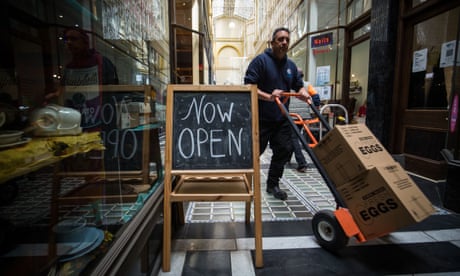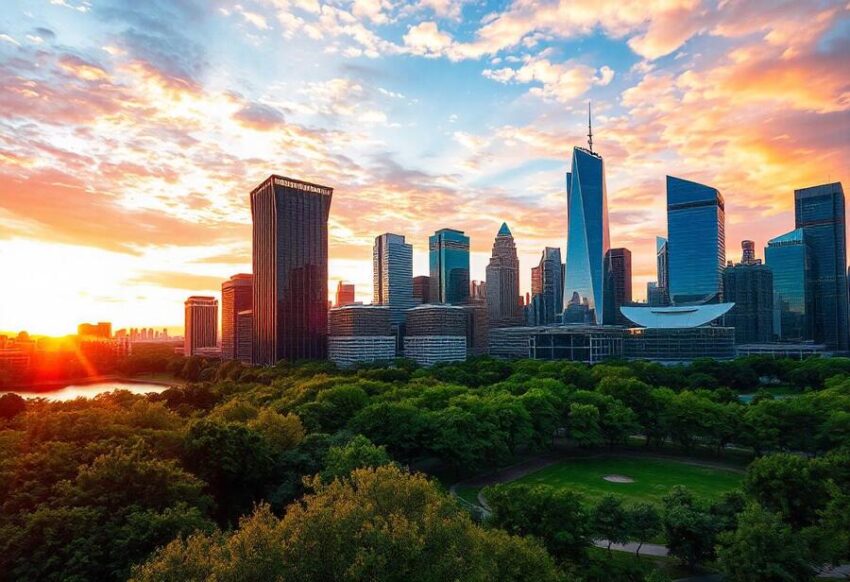- by foxnews
- 01 Feb 2025
?State-induced chaos?: business groups call for less restrictions even as Australia?s Covid cases soar
‘State-induced chaos’: business groups call for less restrictions even as Australia’s Covid cases soar
- by theguardian
- 30 Dec 2021
- in news

Business groups have called on state governments to continue dismantling Covid restrictions even as case numbers soar amid staff shortages caused by the highly contagious Omicron variant.
The groups renewed their demands for the increased use of rapid antigen testing to enable staff who come into contact with coronavirus cases to return to work quickly if they are free of the virus instead of having to wait at least a day for the results of a polymerase chain reaction (PCR) test.
Covid numbers rocketed on Wednesday, with the number of new cases in the nation's most infected state, New South Wales, nearly doubling overnight, from 6,062 to 11,201. Numbers in Victoria, which has the second highest number of cases, also jumped, rising from 2,738 to 3,767.
However, business groups said the economic havoc wreaked by the new variant was mostly due to the responses to it by governments rather than being the direct effect of people getting sick.
Innes Willox, the chief executive of employer association AI Group, said Australian business was "now suffering from state-induced chaos".
"The biggest danger to improving business conditions is not Omicron but the response to it especially by states who continue to act in muddle-headed, self-centred ways by imposing overly-onerous and ever-changing conditions on business, their employees and customers," he said.
"For our recovery to maintain its momentum business needs certainty and continuity from the states who can properly balance risks and not needlessly promote fear."
He said the state and federal governments needed to "make and stick to agreements on border openings, workable testing requirements, the increased use of rapid testing, isolation and distancing rules".
"They have had nearly two years to work this out and so far have failed miserably to work together," he said.
Andrew McKellar, the chief executive of the Australian Chamber of Commerce and Industry, said the Omicron outbreak had triggered "a degree of disruption", some of it caused by the "over caution and overreaction" seen in some states. He singled out Queensland's "very stringent PCR testing requirements and the strain that that's put on resources".
"We're still seeing from business that they are confident [and] they do expect that in the months ahead, we should be able to undergo a very strong period of economic activity," McKellar said.
"The main thing will be to avoid the imposition of very severe restrictions and lockdowns, and I think the signals from all jurisdictions has been that they understand that that has to be an absolute last resort," he said. "There's no appetite to go back into that space."
McKellar said business groups had been calling since September for the provision of rapid antigen testing "as an important part of the armoury" against Covid-19, having watched developments overseas.
It should be an issue for Australia-wide coordination through the national cabinet, he said.
"The federal government has to have a leading role in this in sourcing these supplies and making them freely and widely available in the community to business," McKellar said. "Here's another golden opportunity for our political leaders to work in a unified way."
Jessica Wilson, a policy director at the Business Council of Australia, which represents the country's biggest companies, said that to continue its economic recovery from the Covid recession the nation needed to "tear down remnants of fortress Australia" and "stay the course on reopening".
"That means using every tool we can to keep businesses operating, borders open and supply chains working, including using rapid antigen testing," she said.
"Every time a pub has to shut because of Covid it's not just impacting the licensee but also staff, security, food providers and live music performers - all of who lose pay during this peak season."
Hospitality and retail businesses have so far borne the brunt of the Omicron wave, with many complaining they have been forced to close due to a lack of rapid testing.
"This is the peak period for hospitality so to have another year ruined is devastating for businesses reeling after 20 months of restrictions," John Green, the director of liquor and policing at the NSW branch of the Australian Hotels Association, said.
Margy Osmond, the chief executive of the Tourism and Transport Forum, said staff who were forced to isolate after coming into contact with a Covid-positive person were leaving employers "high and dry".
"The announcements today that the Queensland government will accept a negative rapid antigen test from 1 January and that NSW will relax isolation requirements will be widely welcomed, and is a much more commonsense approach to managing the impacts of the latest outbreak ensuring that people who need to most can get a PCR test and those with holiday plans can make it to their destination," she said.
Alan Oster, the NAB Group chief economist, said the market was already bracing for a negative retail sales figure for December compared with the previous month but more because of the growing popularity of Black Friday online sales rather than a demand dent from Omicron.
"I would have thought confidence might have had a bit of a hit," Oster said. "[As for] actual conditions, their sales, their profits, their employment, I suspect less so.
"It will be soft, and people will say it was Omicron but it won't be - it'll be the change when people buy from Black Friday rather than Boxing Day sales," he said.
NAB's last economic report for 2021, released on 17 December, predicted Australia's economy would rebound sharply from the 1.9% contraction in the September quarter. The bank is predicting a 4% expansion for Australia's economy, less than the Reserve Bank of Australia's 5.5% forecast.
"I'm not sure [Omicron's] going to change the outcome that much but I would not want to be defending a 5.5 to 6% growth rate in 2022," Oster said.
"We always assumed that international travel wouldn't really start at least until the middle of next year," he said, adding NAB's other key assumption remains that governments don't lock down borders.
Anecdotally, Oster also cited evidence of uncertainty in the hospitality sector as households hesitate to make firm bookings because of the risks of sudden pandemic-triggered changes.
His family, for instance, was able to book a table at "Sorrento's best restaurant" for New Year's Eve just two days in advance, when normally the place would have been filled long before.
- by travelandtourworld
- descember 09, 2016
Thailand's Luxury Hotels Achieve Exceptional ADR Growth in 2024, Outpacing London and Singapore in Market Gains
Thailand’s luxury hotels saw remarkable ADR growth in 2024, surpassing London and Singapore in percentage increases, highlighting strong market expansion.
read more


